Abstract
The developments in enteral feeding for Crohn's disease in the past decade are critically reviewed. The advent of amino acid based chemically defined elemental diets signalled the end of 'total bowel rest' in the management of these patients. Subsequently, controlled clinical trials showed that elemental diets were as effective as corticosteroids in inducing clinical remission in patients with acute exacerbations of Crohn's disease. The later use of peptide based elemental diets, in Crohn's disease produced somewhat conflicting results. The initial uncontrolled studies suggest that polymeric whole protein diets might also be effective in the management of acute exacerbations of the disease, casting in turn doubts concerning the role of dietary antigens in the pathogenesis of Crohn's disease. Results of controlled studies comparing the use of elemental and polymeric diets as primary therapy in Crohn's disease have, however, also produced conflicting results. The results of one recent controlled trial in which the use of polymeric diet was compared with that of corticosteroids does, however, suggest that these diets may have a primary therapeutic effect in Crohn's disease. An analysis of the composition of some of the enteral diets used in different trials suggest that the effectiveness of enteral diets in treating active Crohn's disease might relate more to their fat than nitrogen composition. A hypothesis is proposed that the effectiveness of enteral nutrition in the primary therapy of acute exacerbations of Crohn's disease occurs because the successful diets used contain insufficient precursors for arachidonate derived eicosanoid synthesis.
Full text
PDF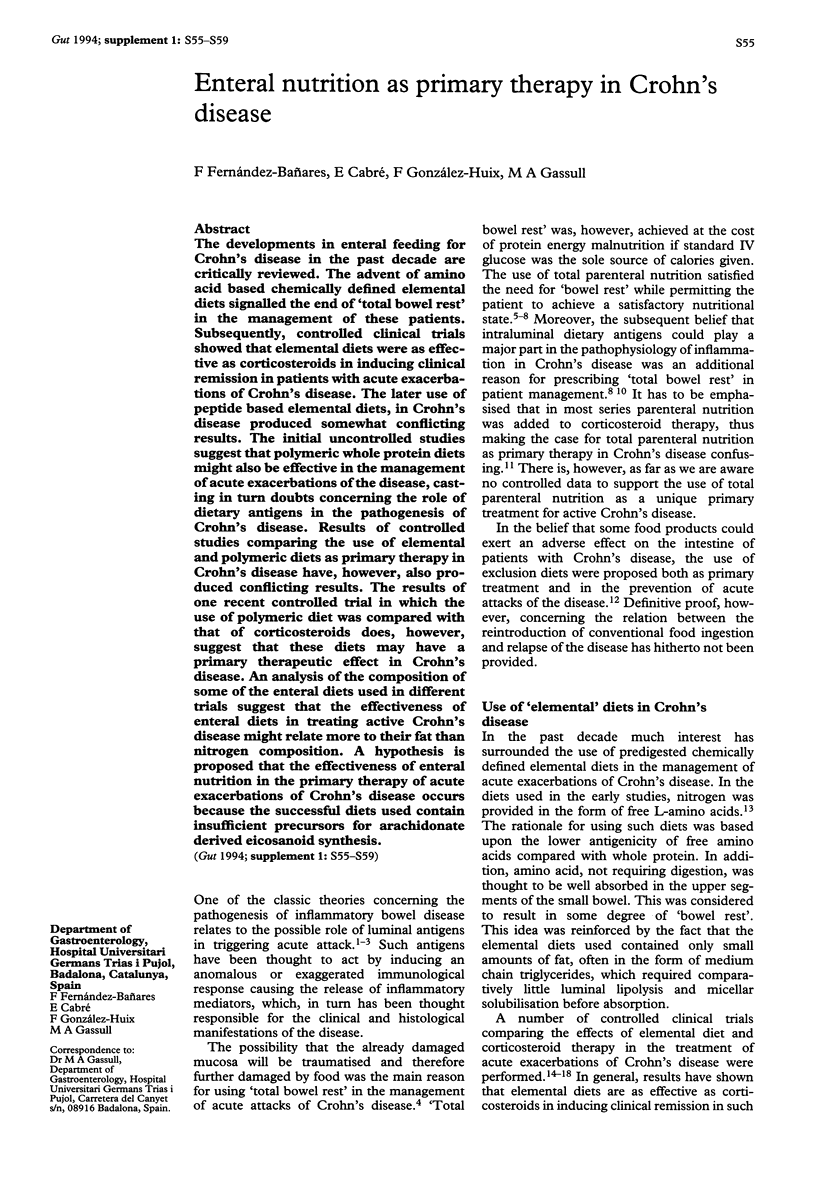
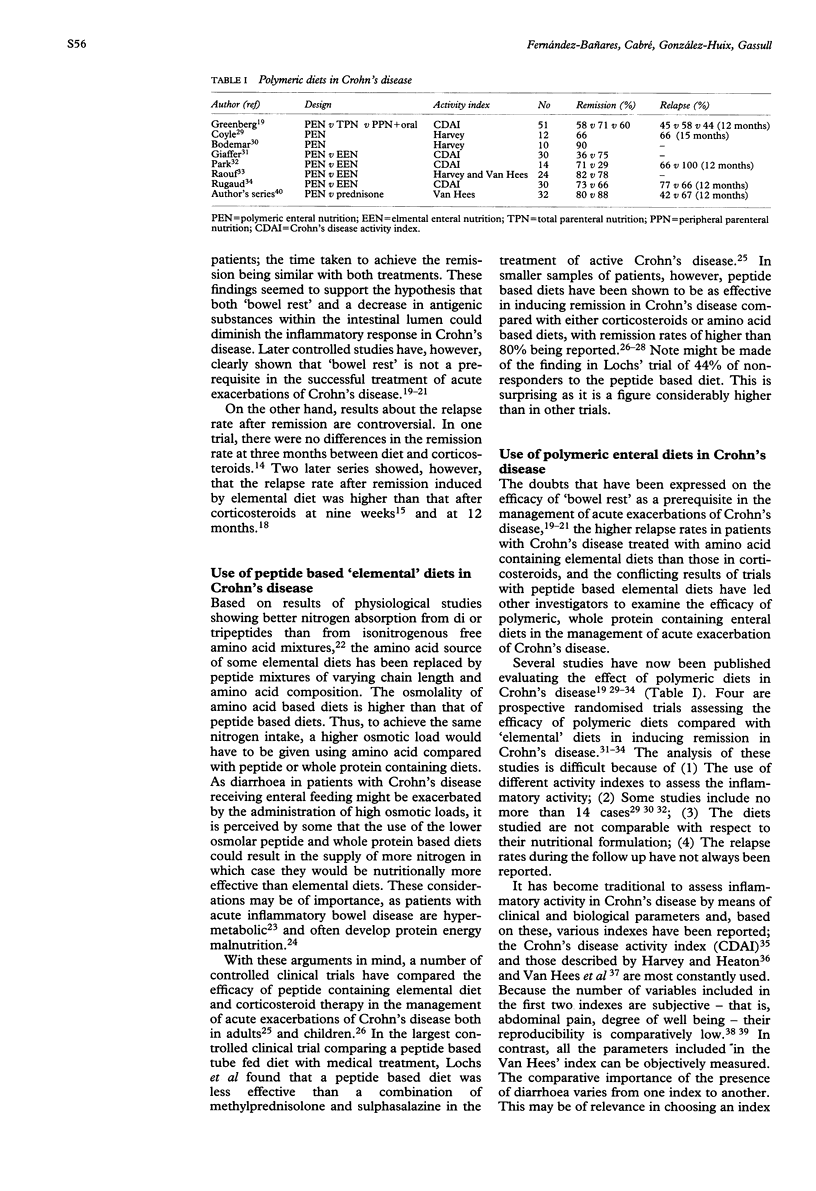
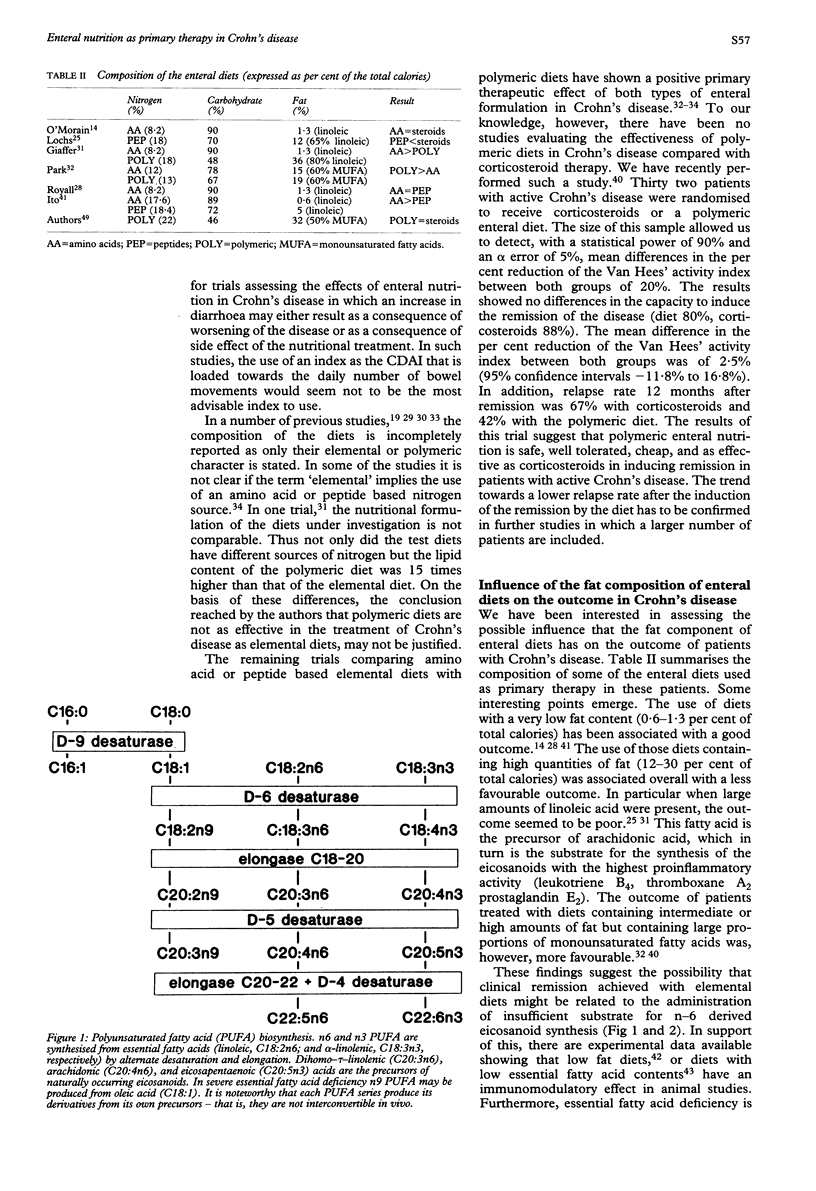
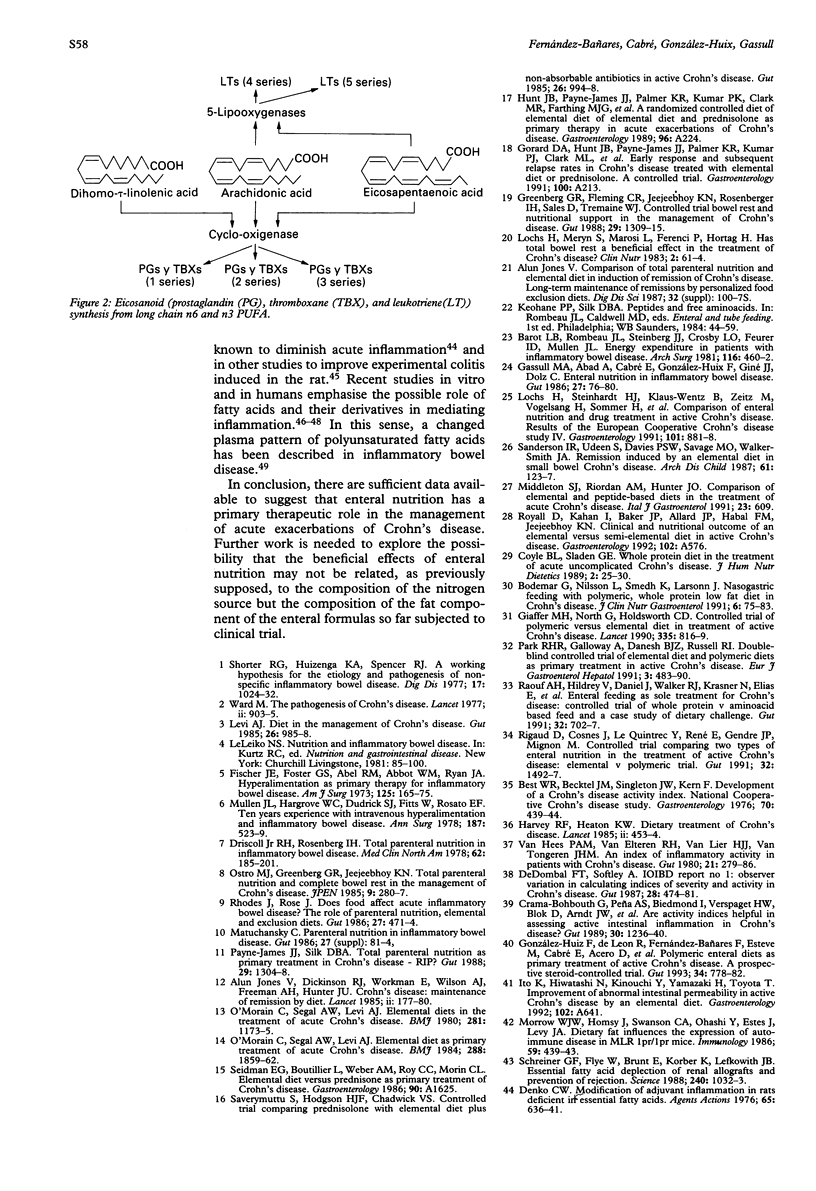
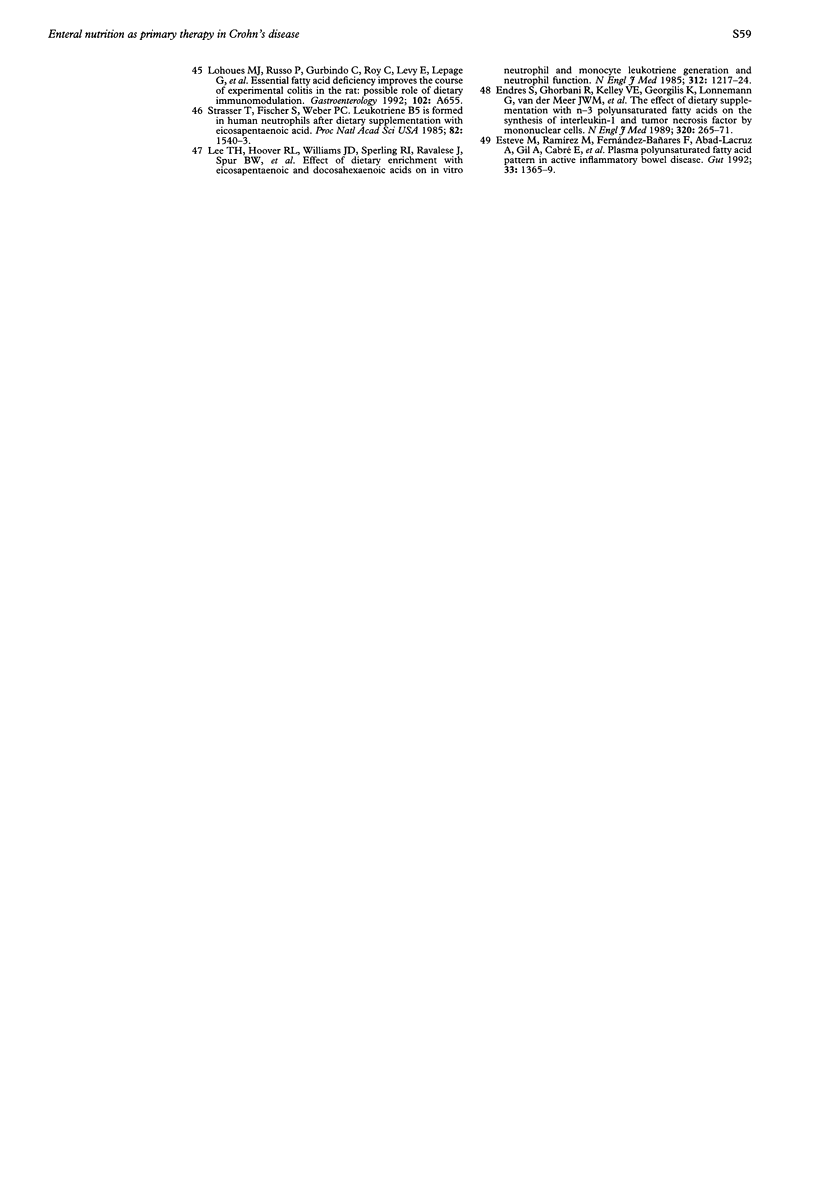
Selected References
These references are in PubMed. This may not be the complete list of references from this article.
- Barot L. R., Rombeau J. L., Steinberg J. J., Crosby L. O., Feurer I. D., Mullen J. L. Energy expenditure in patients with inflammatory bowel disease. Arch Surg. 1981 Apr;116(4):460–462. doi: 10.1001/archsurg.1981.01380160070014. [DOI] [PubMed] [Google Scholar]
- Best W. R., Becktel J. M., Singleton J. W., Kern F., Jr Development of a Crohn's disease activity index. National Cooperative Crohn's Disease Study. Gastroenterology. 1976 Mar;70(3):439–444. [PubMed] [Google Scholar]
- Crama-Bohbouth G., Pena A. S., Biemond I., Verspaget H. W., Blok D., Arndt J. W., Weterman I. T., Pauwels E. K., Lamers C. B. Are activity indices helpful in assessing active intestinal inflammation in Crohn's disease? Gut. 1989 Sep;30(9):1236–1240. doi: 10.1136/gut.30.9.1236. [DOI] [PMC free article] [PubMed] [Google Scholar]
- Denko C. W. Modification of adjuvant inflammation in rats deficient in essential fatty acids. Agents Actions. 1976 Sep;6(5):636–641. doi: 10.1007/BF01971583. [DOI] [PubMed] [Google Scholar]
- Driscoll R. H., Jr, Rosenberg I. H. Total parenteral nutrition in inflammatory bowel disease. Med Clin North Am. 1978 Jan;62(1):185–201. doi: 10.1016/s0025-7125(16)31831-4. [DOI] [PubMed] [Google Scholar]
- Endres S., Ghorbani R., Kelley V. E., Georgilis K., Lonnemann G., van der Meer J. W., Cannon J. G., Rogers T. S., Klempner M. S., Weber P. C. The effect of dietary supplementation with n-3 polyunsaturated fatty acids on the synthesis of interleukin-1 and tumor necrosis factor by mononuclear cells. N Engl J Med. 1989 Feb 2;320(5):265–271. doi: 10.1056/NEJM198902023200501. [DOI] [PubMed] [Google Scholar]
- Esteve-Comas M., Ramírez M., Fernández-Bañares F., Abad-Lacruz A., Gil A., Cabré E., González-Huix F., Moreno J., Humbert P., Guilera M. Plasma polyunsaturated fatty acid pattern in active inflammatory bowel disease. Gut. 1992 Oct;33(10):1365–1369. doi: 10.1136/gut.33.10.1365. [DOI] [PMC free article] [PubMed] [Google Scholar]
- Fischer J. E., Foster G. S., Abel R. M., Abbott W. M., Ryan J. A. Hyperalimentation as primary therapy for inflammatory bowel disease. Am J Surg. 1973 Feb;125(2):165–175. doi: 10.1016/0002-9610(73)90022-6. [DOI] [PubMed] [Google Scholar]
- Gassull M. A., Abad A., Cabré E., González-Huix F., Giné J. J., Dolz C. Enteral nutrition in inflammatory bowel disease. Gut. 1986 Nov;27 (Suppl 1):76–80. doi: 10.1136/gut.27.suppl_1.76. [DOI] [PMC free article] [PubMed] [Google Scholar]
- Giaffer M. H., North G., Holdsworth C. D. Controlled trial of polymeric versus elemental diet in treatment of active Crohn's disease. Lancet. 1990 Apr 7;335(8693):816–819. doi: 10.1016/0140-6736(90)90936-y. [DOI] [PubMed] [Google Scholar]
- González-Huix F., de León R., Fernández-Bañares F., Esteve M., Cabré E., Acero D., Abad-Lacruz A., Figa M., Guilera M., Planas R. Polymeric enteral diets as primary treatment of active Crohn's disease: a prospective steroid controlled trial. Gut. 1993 Jun;34(6):778–782. doi: 10.1136/gut.34.6.778. [DOI] [PMC free article] [PubMed] [Google Scholar]
- Greenberg G. R., Fleming C. R., Jeejeebhoy K. N., Rosenberg I. H., Sales D., Tremaine W. J. Controlled trial of bowel rest and nutritional support in the management of Crohn's disease. Gut. 1988 Oct;29(10):1309–1315. doi: 10.1136/gut.29.10.1309. [DOI] [PMC free article] [PubMed] [Google Scholar]
- Jones V. A., Dickinson R. J., Workman E., Wilson A. J., Freeman A. H., Hunter J. O. Crohn's disease: maintenance of remission by diet. Lancet. 1985 Jul 27;2(8448):177–180. doi: 10.1016/s0140-6736(85)91497-7. [DOI] [PubMed] [Google Scholar]
- Lee T. H., Hoover R. L., Williams J. D., Sperling R. I., Ravalese J., 3rd, Spur B. W., Robinson D. R., Corey E. J., Lewis R. A., Austen K. F. Effect of dietary enrichment with eicosapentaenoic and docosahexaenoic acids on in vitro neutrophil and monocyte leukotriene generation and neutrophil function. N Engl J Med. 1985 May 9;312(19):1217–1224. doi: 10.1056/NEJM198505093121903. [DOI] [PubMed] [Google Scholar]
- Levi A. J. Diet in the management of Crohn's disease. Gut. 1985 Oct;26(10):985–988. doi: 10.1136/gut.26.10.985. [DOI] [PMC free article] [PubMed] [Google Scholar]
- Lochs H., Meryn S., Marosi L., Ferenci P., Hörtnagl H. Has total bowel rest a beneficial effect in the treatment of Crohn's disease? Clin Nutr. 1983 Apr;2(1):61–64. doi: 10.1016/0261-5614(83)90033-x. [DOI] [PubMed] [Google Scholar]
- Lochs H., Steinhardt H. J., Klaus-Wentz B., Zeitz M., Vogelsang H., Sommer H., Fleig W. E., Bauer P., Schirrmeister J., Malchow H. Comparison of enteral nutrition and drug treatment in active Crohn's disease. Results of the European Cooperative Crohn's Disease Study. IV. Gastroenterology. 1991 Oct;101(4):881–888. doi: 10.1016/0016-5085(91)90711-s. [DOI] [PubMed] [Google Scholar]
- Matuchansky C. Parenteral nutrition in inflammatory bowel disease. Gut. 1986 Nov;27 (Suppl 1):81–84. doi: 10.1136/gut.27.suppl_1.81. [DOI] [PMC free article] [PubMed] [Google Scholar]
- Morrow W. J., Homsy J., Swanson C. A., Ohashi Y., Estes J., Levy J. A. Dietary fat influences the expression of autoimmune disease in MRL/lpr/lpr mice. Immunology. 1986 Nov;59(3):439–443. [PMC free article] [PubMed] [Google Scholar]
- Mullen J. L., Hargrove W. C., Dudrick S. J., Fitts W. T., Jr, Rosato E. F. Ten years experience with intravenous hyperalimentation and inflammatory bowel disease. Ann Surg. 1978 May;187(5):523–529. doi: 10.1097/00000658-197805000-00010. [DOI] [PMC free article] [PubMed] [Google Scholar]
- O'Morain C., Segal A. W., Levi A. J. Elemental diets in treatment of acute Crohn's disease. Br Med J. 1980 Nov 1;281(6249):1173–1175. doi: 10.1136/bmj.281.6249.1173. [DOI] [PMC free article] [PubMed] [Google Scholar]
- O'Moráin C., Segal A. W., Levi A. J. Elemental diet as primary treatment of acute Crohn's disease: a controlled trial. Br Med J (Clin Res Ed) 1984 Jun 23;288(6434):1859–1862. doi: 10.1136/bmj.288.6434.1859. [DOI] [PMC free article] [PubMed] [Google Scholar]
- Ostro M. J., Greenberg G. R., Jeejeebhoy K. N. Total parenteral nutrition and complete bowel rest in the management of Crohn's disease. JPEN J Parenter Enteral Nutr. 1985 May-Jun;9(3):280–287. doi: 10.1177/0148607185009003280. [DOI] [PubMed] [Google Scholar]
- Payne-James J. J., Silk D. B. Total parenteral nutrition as primary treatment in Crohn's disease--RIP? Gut. 1988 Oct;29(10):1304–1308. doi: 10.1136/gut.29.10.1304. [DOI] [PMC free article] [PubMed] [Google Scholar]
- Raouf A. H., Hildrey V., Daniel J., Walker R. J., Krasner N., Elias E., Rhodes J. M. Enteral feeding as sole treatment for Crohn's disease: controlled trial of whole protein v amino acid based feed and a case study of dietary challenge. Gut. 1991 Jun;32(6):702–707. doi: 10.1136/gut.32.6.702. [DOI] [PMC free article] [PubMed] [Google Scholar]
- Rhodes J., Rose J. Does food affect acute inflammatory bowel disease? The role of parenteral nutrition, elemental and exclusion diets. Gut. 1986 May;27(5):471–474. doi: 10.1136/gut.27.5.471. [DOI] [PMC free article] [PubMed] [Google Scholar]
- Rigaud D., Cosnes J., Le Quintrec Y., René E., Gendre J. P., Mignon M. Controlled trial comparing two types of enteral nutrition in treatment of active Crohn's disease: elemental versus polymeric diet. Gut. 1991 Dec;32(12):1492–1497. doi: 10.1136/gut.32.12.1492. [DOI] [PMC free article] [PubMed] [Google Scholar]
- Saverymuttu S., Hodgson H. J., Chadwick V. S. Controlled trial comparing prednisolone with an elemental diet plus non-absorbable antibiotics in active Crohn's disease. Gut. 1985 Oct;26(10):994–998. doi: 10.1136/gut.26.10.994. [DOI] [PMC free article] [PubMed] [Google Scholar]
- Schreiner G. F., Flye W., Brunt E., Korber K., Lefkowith J. B. Essential fatty acid depletion of renal allografts and prevention of rejection. Science. 1988 May 20;240(4855):1032–1033. doi: 10.1126/science.3285468. [DOI] [PubMed] [Google Scholar]
- Shorter R. G., Huizenga K. A., Spencer R. J. A working hypothesis for the etiology and pathogenesis of nonspecific inflammatory bowel disease. Am J Dig Dis. 1972 Nov;17(11):1024–1032. doi: 10.1007/BF02239143. [DOI] [PubMed] [Google Scholar]
- Strasser T., Fischer S., Weber P. C. Leukotriene B5 is formed in human neutrophils after dietary supplementation with icosapentaenoic acid. Proc Natl Acad Sci U S A. 1985 Mar;82(5):1540–1543. doi: 10.1073/pnas.82.5.1540. [DOI] [PMC free article] [PubMed] [Google Scholar]
- Ward M. The pathogenesis of Crohn's disease. Lancet. 1977 Oct 29;2(8044):903–905. doi: 10.1016/s0140-6736(77)90835-2. [DOI] [PubMed] [Google Scholar]
- de Dombal F. T., Softley A. IOIBD report no 1: Observer variation in calculating indices of severity and activity in Crohn's disease. International Organisation for the Study of Inflammatory Bowel Disease. Gut. 1987 Apr;28(4):474–481. doi: 10.1136/gut.28.4.474. [DOI] [PMC free article] [PubMed] [Google Scholar]
- van Hees P. A., van Elteren P. H., van Lier H. J., van Tongeren J. H. An index of inflammatory activity in patients with Crohn's disease. Gut. 1980 Apr;21(4):279–286. doi: 10.1136/gut.21.4.279. [DOI] [PMC free article] [PubMed] [Google Scholar]


